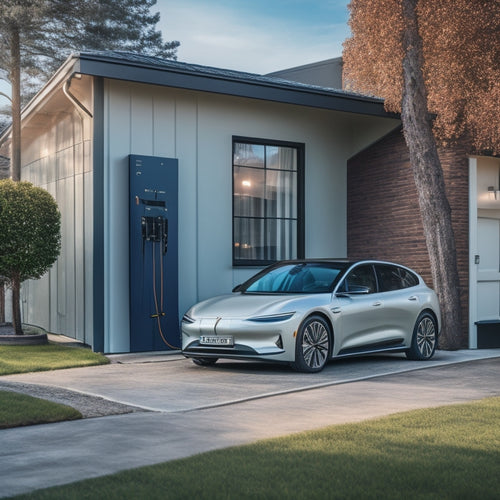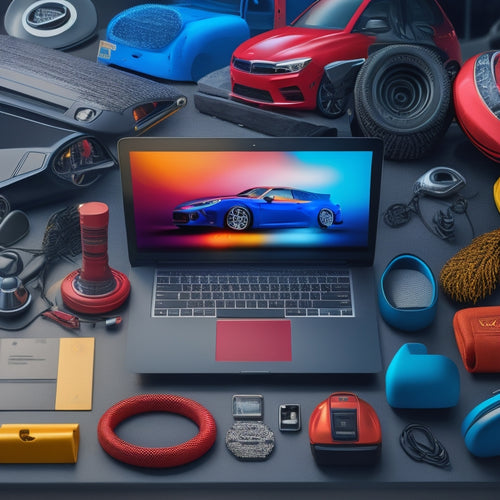
5 Ways Bike Sharing Boosts Urban Sustainability
Share
As you explore bike-sharing options, you'll discover five ways it boosts urban sustainability. By reducing congestion and emissions, bike-sharing systems improve air quality and make commutes smoother. It also promotes alternative transportation methods, encouraging sustainable urban mobility and raising awareness through community outreach. Additionally, bike-sharing fosters active and healthy living, enhances urban mobility, and supports eco-friendly city planning. By prioritizing people over cars, bike-sharing paves the way for sustainable, eco-friendly environments. Dive deeper into the benefits, and you'll uncover the transformative power of bike-sharing in urban sustainability.
Key Takeaways
• Bike-sharing systems reduce congestion and emissions, altering traffic patterns for smoother commutes and improving air quality.
• By providing a convenient and affordable transportation option, bike-sharing promotes sustainable urban mobility and raises awareness through community outreach.
• Bike-sharing encourages active and healthy living, boosting mood, energy levels, and fitness, while fostering community engagement through events and workshops.
• By offering efficient urban navigation, bike-sharing improves accessibility and equal access to opportunities, enhancing rural connectivity for economic growth.
• By incorporating bike-sharing, cities can prioritize people over cars, creating sustainable, eco-friendly environments that enhance air quality and overall quality of life.
Reducing Congestion and Emissions
By switching to bike-sharing systems, you can greatly reduce the number of cars on the road, thereby decreasing congestion and emissions in urban areas. This shift can greatly alter traffic patterns, making your daily commute smoother and more efficient.
With smart infrastructure in place, bike-sharing systems can seamlessly integrate with public transportation, providing a convenient alternative to driving. By choosing to bike, you're not only reducing your carbon footprint but also contributing to a cleaner, healthier environment.
As you pedal through the city, you're helping to decrease the number of vehicles on the road, subsequently reducing air pollution and greenhouse gas emissions. This, in turn, can lead to improved air quality, benefiting both your health and the environment.
Promoting Alternative Transportation Methods
As you explore alternative modes of transportation, you'll find that bike-sharing systems can be a catalyst for a broader cultural shift towards sustainable urban mobility. By providing a convenient and affordable way to get around, bike-sharing encourages people to ditch their cars and opt for a more environmentally friendly mode of transportation. This, in turn, can lead to a reduction in congestion and emissions, making our cities cleaner and healthier.
| Strategy | Benefits | Implementation |
|---|---|---|
| Community Outreach | Raises awareness about bike-sharing options | Partner with local organizations to promote bike-sharing |
| Economic Incentives | Encourages people to use bike-sharing | Offer discounts or rewards for frequent users |
| Infrastructure Development | Improves bikeability and walkability | Invest in bike lanes, bike paths, and pedestrian-friendly infrastructure |
Encouraging Active and Healthy Living
When you hop on a bike, you're not only reducing your carbon footprint but also investing in your physical and mental well-being. Bike sharing encourages active and healthy living, promoting a lifestyle that's good for you and the planet. Regular cycling can boost your mood, energy levels, and overall fitness, making it an excellent way to stay healthy. Furthermore, bike sharing schemes often offer fitness incentives, such as discounts for frequent riders or rewards for reaching cycling milestones, motivating you to keep pedaling.
Community engagement is also a significant aspect of bike sharing. Many bike-sharing programs partner with local organizations to host cycling events, workshops, and rides, fostering a sense of community among riders. This encourages more people to get involved, promoting a culture of active living and social connection. By making cycling accessible and enjoyable, bike sharing helps create healthier, happier citizens, which in turn contributes to a more sustainable urban environment.
Enhancing Urban Mobility and Access
You can easily navigate urban landscapes with bike sharing, which provides an efficient and convenient alternative to traditional transportation methods, allowing you to quickly move around the city while reducing traffic congestion. By providing an affordable and accessible mode of transportation, bike sharing helps bridge the gap of Urban Inequality, ensuring that everyone has equal access to opportunities and resources. Additionally, bike sharing can also enhance Rural Connectivity by providing a sustainable transportation option for rural areas, promoting economic growth and development.
| Benefits | Urban Areas | Rural Areas |
|---|---|---|
| Increased mobility | Reduced traffic congestion | Enhanced rural connectivity |
| Improved accessibility | Equal access to opportunities | Economic growth and development |
| Reduced emissions | Reduced air pollution | Sustainable transportation option |
| Cost-effective | Affordable transportation | Reduced transportation costs |
Supporting Eco-Friendly City Planning
By incorporating bike sharing into urban planning, cities can reduce their carbon footprint and create more sustainable, eco-friendly environments that prioritize people over cars. As you explore your city, you'll notice a shift from congested streets to vibrant green spaces, where bike lanes and pedestrian paths take center stage. This transformation not only improves air quality but also enhances the overall quality of life for citizens.
Urban forestry initiatives can thrive alongside bike sharing, as cities invest in tree-lined bike paths and parks, creating natural buffers against pollution and noise pollution. By prioritizing eco-friendly city planning, you'll experience a more livable, breathable city, where the sounds of nature replace the hum of traffic.
Bike sharing becomes a catalyst for sustainable urban development, encouraging cities to rethink their infrastructure and prioritize people-centric design. As you navigate your city, you'll discover a harmonious balance between urban life and nature, where bike sharing is the key to opening up a greener, healthier urban landscape.
Frequently Asked Questions
Are Bike-Sharing Services Usually Available 24/7 Throughout the Year?
You'll find that most bike-sharing services operate 24/7, year-round, with peak hours typically during morning and evening commutes, but some systems may have limited hours or seasonal adjustments, so it's best to check with the provider for specifics.
How Do Bike-Sharing Systems Ensure the Bicycles Are Well-Maintained and Safe?
As you pedal through the city, you might wonder how bike-sharing systems keep their bicycles in top shape. Think of it like a health check-up: regular inspections and stringent safety protocols guarantee the bikes are in pristine condition, so you can ride with confidence.
Can I Reserve a Bike in Advance or Only Rent on the Spot?
"Curious about advance booking? You can usually reserve a bike online or through the app, checking availability and booking in advance, especially handy during peak hours or for group rides, ensuring a smooth ride ahead."
Are Helmets Provided With the Rented Bikes, or Do I Bring My Own?
When renting a bike, you'll want to know that helmet regulations vary by city, so you might need to bring your own to guarantee bike safety, or check with the rental provider for theirs.
What Happens if I Have a Problem With the Bike During My Rental Period?
"Did you know 70% of bike-sharing users opt for eco-friendly transportation? If you encounter an issue, don't worry! You can quickly report the fault through the mobile app, contact the 24/7 Support Hotline, or swap your bike for a new one via Cycle Swap - we've got you covered!"
Related Posts
-

5 Essential Tips for Buying EV Charging Systems Online
When purchasing an EV charging system online, you'll want to make sure you're making an informed decision. First, det...
-

Top Portable Solar Panels for Cars to Buy Online
When shopping for portable solar panels for your car, you'll want to take into account reputable brands like Renogy, ...
-

Top 10 Tips for Buying Car Accessories Online
When purchasing car accessories online, you should take proactive steps to avoid low-quality or incompatible products...


